12 F. high on Tuesday in the Twin Cities.
29 F. average high on December 10.
20 F. high on December 10, 2012.
1.8" snow fell yesterday morning.
5" snow on the ground at KMSP.
Windchill Advisory Posted. It may feel as cold as -25 to -30F for a time this morning.
Not Bitter
Some
days the weather column just writes itself. Like today. Until further
notice I will refrain from using the word "bitter", after the note I
received from Steve Hepokoksi in Maple Grove.
"Bitter is a state
of mind, and if you keep using the word, soon we all will be. I
challenge you to not use the word through the entire month of January.
Feel free to start now. Fortifying, challenging, piercing,
tear-inducing, bracing, stinging, OMGing, cryogenic, invigorating - it
doesn’t have to be a happy word. Just not “bitter”. Please?" Steve
implored.
O.K. Good point, Steve. I've banned the word from my
lexicon, for the rest of December and all of January. It's the least I
can do to help out. We're already in a fragile state, mentally. I don't
want to pile on.
December is on life-support; the maps looks like
late January, and no real improvement in our ("severe chilly")
conditions are likely until late next week. The thaw keeps getting
pushed back, but it's coming.
I may head to Deadhorse, Alaska to warm up. According to Christopher Burt at
Weather Underground
a recent high of 39F (with rain) was the warmest December temperature
ever observed on Alaska's arctic shoreline. Good for them.
No
big storms are brewing, just a machine-gun volley of clippers, each one
dragging reinforcing jolts of cryogenic chill into Minnesota.
Hey, just don't call it bitter, OK?
* photo above courtesy of Steve Burns.
1996. The first 10 days of December have been the coldest since 1996, according to NOAA data.
A Light At The End Of Our Siberian Tunnel?
The first 10 days of December are running more than 9F colder than
average - the last time we saw freezing in the metro was December 4
(high of 32F). We're due. A few more puffs of fresh, Yukon air arrive:
today, again Sunday and early Monday, one more dip early Wednesday, and
then maybe a shot at 32 by Thursday of next week, according to ECMWF
guidance. I know - it keeps getting pushed back. Don't hold your breath.
Graph: Weatherspark.
Like Something Out Of Late January.
The weather maps don't look like mid-December, but rather something out
of the latter half of January, when temperatures nationwide usually
bottom out. Will December wind up being the coldest month of the winter?
Possible, but statistically January is the coldest month. NOAA's 12km
NAM shows the freezing line dipping as far south as the Florida
Panhandle, subzero air pinwheeling across the Upper Midwest and Great
Lakes over the next 84 hours. Loop: Ham Weather.
Santa Better Bring The Antifreeze.
Now sure what the rating is on his sleigh, but he may be in for a
numbing ride across Minnesota and the Upper Midwest, if NOAA's GFS
extended outlook pans out - hinting at a strong subzero burst after
December 23.
Winter Driving Tips - How Can Alaska Be Warmer Than Oklahoma? In today's
Climate Matters
we take a look at Sunday's 30-car pile-up in southeastern Wisconsin.
All it takes is one aggressive driver, moving too fast for conditions.
It was a reminder that the temperature of a snowstorm is critical - the
colder the storm, the greater the potential for snow compaction and
glaze ice. Nothing short of a tank will provide reliable traction when
there's freezing rain on the highways: "
WeatherNationTV Chief
Meteorologist Paul Douglas goes over the recent cold snap and the
conditions that went into a major 30 car pileup in Milwaukee. Where are
the warm spots in the US? How is Alaska warmer than the Panhandle of
Texas?"
Last Week: Colder Than Any Week Last Winter? Here's a post from
NOAA that caught my eye: "
This
last week the spatially averaged temperature for the United States was
lower than at any time last year. Low temperatures like these are a rare
occurrence and have only occurred 29 out of 1054 December Days since
1979, (NCEP Reanalysis). Needless to say it's COLD!"
Snowfall Amounts From Tuesday's Burst.
A ripple of low pressure riding up along the leading edge of very cold
air squeeed out more accumulating snow yesterday. D.C. missed out on the
fun (this time), but there was a narrow band of 2-6" from western
Maryland and southern Pennsylvania into the suburbs of New York City.
Source: NOAA.
A Celestial Wonder.
I can count on Steve Burns to provide me with (incredible) imagery of
both weather and astronomical events - he has a great eye, and passed
along these photos taken over the weekend. One advantage of arctic air:
skies are often crystal clear, making it easier to take in an aurora. He
writes: "
Went up around Pine City (Chengwatana SF) to take some
aurora pics last night. The thermometer in my car read -22 but I got
some good shots! I’m working on a time-lapse and if it’s worthwhile
I’ll send your way. Enjoy!"
Severe 2012 Solar Storm Narrowly Missed Earth.
Hey, I didn't bury the good news! If you doubt that (everything) is
hanging by a slender, delicate thread, check out this press release and
article from
The University of Colorado, Boulder; here's a clip: "
A
massive ejection of material from the sun initially traveling at over 7
million miles per hour that narrowly missed Earth last year is an event
solar scientists hope will open the eyes of policymakers regarding the
impacts and mitigation of severe space weather, says a University of
Colorado Boulder professor. The coronal mass ejection, or CME, event was
likely more powerful than the famous Carrington storm of 1859, whent he
sun blasted Earth's atmosphere hard enough twice to light up the sky
from the North Pole to Central America and allowed New Englanders to
read their newspapers at night by aurora light, said CU-Boulder
Professor Daniel Baker. had it hit Earth, the July 2012 event likely
would have created a technological disaster by short-circuiting
satellites, power grids, ground communication equipment and even
threatening the health of astronomers and aircraft crews, he said...."
Image credit: Natural Sciences Institutes - Discovery & Innovation.
•
- See more at: http://www.colorado.edu/news/features/severe-2012-solar-storm-narrowly-missed-earth#sthash.PKD60G4P.dpuf
A
massive ejection of material from the sun initially traveling at over 7
million miles per hour that narrowly missed Earth last year is an event
solar scientists hope will open the eyes of policymakers regarding the
impacts and mitigation of severe space weather, says a University of
Colorado Boulder professor.
The coronal mass ejection, or CME,
event was likely more powerful than the famous Carrington storm of 1859,
when the sun blasted Earth’s atmosphere hard enough twice to light up
the sky from the North Pole to Central America and allowed New
Englanders to read their newspapers at night by aurora light, said
CU-Boulder Professor Daniel Baker. Had it hit Earth, the July 2012 event
likely would have created a technological disaster by short-circuiting
satellites, power grids, ground communication equipment and even
threatening the health of astronauts and aircraft crews, he said. - See
more at:
http://www.colorado.edu/news/features/severe-2012-solar-storm-narrowly-missed-earth#sthash.PKD60G4P.dpuf
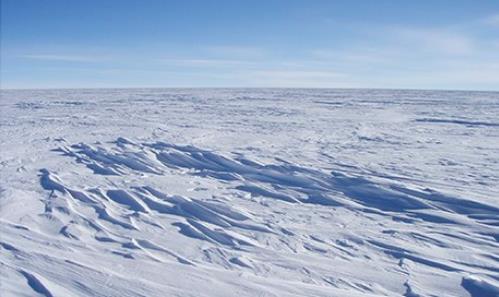
Coldest Temperature Ever Recorded On Earth In Antarctica: -94.7C (-135.8F). The Guardian has details; here's an excerpt: "
Newly analysed NASA satellite data from east Antarctica
shows Earth has set a new record for coldest temperature ever recorded:
-94.7C (-135.8F). It happened in August 2010 when it hit -94.7C
(-135.8F). Then on 31 July of this year, it came close again: -92.9C
(-135.3F). The old record had been -89.2C (-128.6F). Ice scientist Ted
Scambos at the National Snow and Ice Data Centre announced the cold
facts at the American Geophysical Union scientific meeting in San
Francisco on Monday..."
Photo credit above: "
NASA satellite data revealed that Earth set a new record for coldest temperature recorded in east Antarctica." Photograph: Atsuhiro Muto/AP.
Israel Gears Up For Five-Day Winter Storm. Much of the Northern Hemisphere is getting smacked, including The Holy Land. Here's an excerpt from
The Times of Israel: "...“
Rough
seas” and low-lying flood warnings are predicted for Wednesday, which
is to see continued winds and snow in the Golan Heights and high Galilee
areas, including Safed. Snowfall in those areas is expected to continue
Thursday and is likely to spread to central high-altitude locations,
including Jerusalem, as well as the northern Negev mountains. The
central and southern areas could see snow throughout Friday as well..."
Photo credit above: "Snow at the Western Wall in Jerusalem, on January 9, 2013." (photo credit: Louis Fisher/Flash90).
Smog Hits Half Of China, 104 Cities Severely Polluted. Here's what happens when you don't have the equivalent of an EPA, when economic growth trumps (everything else).
Epoch Times has the story; here's an excerpt: "
The
China Meteorological Administration sent out an orange alert for smog
on Dec. 8, which is the third day of continuous, high-level air
pollution alerts. Orange is the second most severe alert issued. Data
from the Ministry of Environmental Protection shows that air quality in
104 cities in 20 provinces are suffering from heavy pollution, according
to the regime mouthpiece Xinhua news agency. Nearly half of China has
been hit by smog, with the southeastern regions of China having the most
severe smog conditions. All the 23 air-quality monitoring stations in
southern China’s Hunan Province show “heavy pollution” on the afternoon
on Dec. 8..."
Decoding A Tsunami's Source.
Here's a clip from a remarkable story talking about the trigger for
Japan's devastating 2011 earthquake and resulting tsunami, courtesy of
The New York Times: "
In the powerful earthquake off Japan in 2011,
the size of the destructive tsunami it spawned caught scientists by
surprise. But they soon learned why the waves were so large:
measurements showed that part of the seafloor along the fault moved as
much as 50 meters, or 55 yards, to the east, displacing an enormous
amount of water. That degree of movement, the largest ever measured for
an earthquake, surprised scientists, too. The quake occurred in a subduction zone,
where one of the planet’s tectonic plates dives beneath another. It was
thought that the largest slip would occur at greater depths, and that
shallower parts of the fault, nearer the seafloor, would move less..."
Photo credit above: Kyodo News, via Associated Press. "A view of the destruction left by the tsunami that hit Japan in March 2011."
Now We Can Predict Where And When Extreme Weather Is Likely To Hit Up To Two Months In Advance. I'm skeptical, but - if true - this would be an important breakthrough. Here's an excerpt from Reuters, Business Insider and
Yahoo Finance: "
A
vehicle sits on a pile of debris from the destruction caused by a
tornado that touched down in Washington, Illinois, November 17, 2013.
Extreme weather, like the insane Colorado flooding in September and the tornadoes that ripped through Illinois
in November, is rocking the Midwest. Normally we don't have much
advanced warning for storms like these, but a new tool from researchers
at Utah State University could help predict when this kind of
destructive extreme weather is more likely. Their research was published
in the Journal of Geophysical Research
on Oct. 15. This weather-predicting index was created by monitoring a
specific weather pattern — a low-level jet stream that interacts with
another circumglobal stream — that makes strong storms and tornadoes
form in the Midwest..."
Researcher Looks To Improve Predictions Of Decades-Long Weather Cycles. Hey, we have enough trouble with the 7-Day Outlook, but I'm keeping an open mind. Here's an excerpt of a story at
Ravalli Republic: "
What
if decade-long cycles of wet and dry weather could be reliably
predicted several years in advance? The economic benefit could be in the
billions, said Vikram Mehta, president and executive director of The
Center for Research on the Changing Earth System of Maryland. “Economic
impacts are so large that people better take interest in what’s going
on,” Mehta said. The forecast for accurately predicting “decadal climate
variability” – 10- to 20-year wet and dry weather cycles caused by
interactions between the Pacific and Atlantic oceans and the atmosphere –
looks promising to Mehta..."
Bakersfield Weathercaster Gets "Time Out" After False Snow Forecast. You can't make this stuff up; here's a video clip and excerpt from TVSpy: "KBAK-KBFX weathercaster Aaron Perlman was put in a “temporary time-out” this morning after wrongly predicting snow in Bakersfield over the weekend. “There are windows in that corner. You can look out the windows,” anchor Rob Finnerty said. “Be sure sure to take note there is no snow out there.”
Rocking 7 Continents. Metallica just played in Antarctica, making it the only band to play in all 7 continents. Rolling Stone has the details.
Can You Get PTSD From Watching Media Coverage Of An Event? Maybe.
From the 9/11 attacks to mass shootings to the bombing of the Boston
Marathon, it seems some of us can be physically and mentally impacted by
the images we're witnessing. Here's a clip from a story at
The Los Angeles Times: "
Post-traumatic stress disorder
has been on psychiatry's books for just 23 years, and before the
terrorist attacks of Sept. 11, 2001, no one ever entertained the
possibility that watching disturbing images of trauma on TV could give
rise to the disorder. The notion remains controversial, but new research
suggests that PTSD might indeed be transmitted over the airwaves. The
study finds that those who spent more than six hours a day watching
media coverage of the April 15 Boston Marathon bombing
and its aftermath suffered more powerful stress reactions than did
people who were directly involved but watched less news coverage of the
events..."
Image credit above: National Center on Domestic and Sexual Violence.
Snacking Your Way To Better Health. Go nuts! Literally. Nuts may have the ability to extend/prolong your life, as crazy as that sounds. Here's a clip from a
New York Times article: "...
The
more often nuts were consumed, the less likely participants were to die
of cancer, heart disease and respiratory disease, and not because nut
eaters succumbed to other diseases. Their death rate from any cause was
lower during the years they were followed. (The nuts in question were
pistachios, almonds, Brazil nuts, cashews, hazelnuts, macadamias,
pecans, pine nuts, peanuts and walnuts.) Those who ate nuts seven or
more times a week were 20 percent less likely to die from 1980 to 2010;
even among those who consumed nuts less often than once a week, the
death rate was 11 percent lower than for those who did not eat them..."
Image credit:
Lou Beach.
Materialism: A System That Eats Us From The Inside Out.
Can you buy your way to happiness? Probably not. All that stuff your
mom taught you, that "money can't buy happiness" may be true after all.
And a system based on consumption, an endless treadmill of consumerism,
requires more energy, most of it carbon-based, and almost
incomprehensible amounts of waste. According to George Monbiot "Buying
more stuff is associated with depression, anxiety and broken
relationships. It is socially destructive and self-destructive". Here's a
clip from his essay at The Guardian: "...
It suggests that materialism, a trait that can afflict both rich and poor, and which the researchers define as "a value system that is preoccupied with possessions and the social image they project",
is both socially destructive and self-destructive. It smashes the
happiness and peace of mind of those who succumb to it. It's associated
with anxiety, depression and broken relationships. There has long been a
correlation observed between materialism, a lack of empathy and
engagement with others, and unhappiness. But research conducted over the
past few years seems to show causation. For example, a series of studies
published in the journal Motivation and Emotion in July showed that as
people become more materialistic, their wellbeing (good relationships,
autonomy, sense of purpose and the rest) diminishes. As they become less
materialistic, it rises..."
Photo credit above: "
Owning more doesn't bring happiness: 'the material pursuit of self-esteem reduces self-esteem.' Photograph: Dominic Lipinski/PA.
The Disruptive Power Of Choice: Are Too Many Options Eroding Credibility, Relevance Of News? Here's another article that caught my eye, this one courtesy of
Bubble & Blender; here's a clip: "
In his compelling book The Paradox of Choice, psychologist
Barry Schwartz describes our modern culture in which the freedom of
choice gives way to too much choice which in turn leads to deepening dissatisfaction. While some choice is good and leads to a sense of independence and satisfaction,
Schwartz argues effectively that when faced with too many choices we
are more likely to regret both the choice we make and those we didn’t..."
"Smart Bra" Concept Aims To Modify Emotional Eating Behavior. And wouldn't this look good under the tree in a couple of weeks?
Gizmag has the curious details: "
Microsoft
is throwing its hat (or rather, bra) into the ring, combining with
engineers from the University of Rochester and the University of
Southampton to develop a mobile platform which can infer your current
emotional state and provide just-in-time feedback on when eating is a
bad idea. Where do they hide the apparatus? In a bra..."
TODAY: Windchill Advisory. Arctic sun - fresh air! Feels like -25F. High: near 0
WEDNESDAY NIGHT: Clouds increase, not a cold. Low: -3
THURSDAY: Partly sunny, even milder. High: 17
FRIDAY: Patchy clouds, still a bit brisk. Wake-up: 10. High: 16
SATURDAY: Very light snow or flurries. Wake-up: 12. High: 18
SUNDAY: More subzero fun! Sunny & numb. Wake-up: 0. High: 4
MONDAY: Light snow. Light accumulation? Wake-up: -3. High: 13
TUESDAY: Some sun, not as nippy. Wake-up: 7. High: near 20
* photo above: Mike Hall Photography.
Climate Stories...
Earth's Sensitivity To Climate Change Could Be "Double" Previous Estimates, Say Geologists. Here's an excerpt from a press release by
The Geological Society: "
The
sensitivity of the Earth’s climate to CO2 could be double what has been
previously estimated, according to a statement issued by the Geological
Society of London. In an addendum to 2010’s ‘Climate change: Evidence
from the Geological Record’, the statement notes that many climate
models typically look at short term, rapid factors when calculating the
Earth’s climate sensitivity – defined as the mean global temperature
increase brought about by a doubling of atmospheric CO2. It is well
known that a doubling of atmospheric CO2 levels could result in
temperature increases of between 1.5 and 4.5°C, due to fast changes such
as snow and ice melt, and the behaviour of clouds and water vapour..." (Image: World Meteorological Organization).
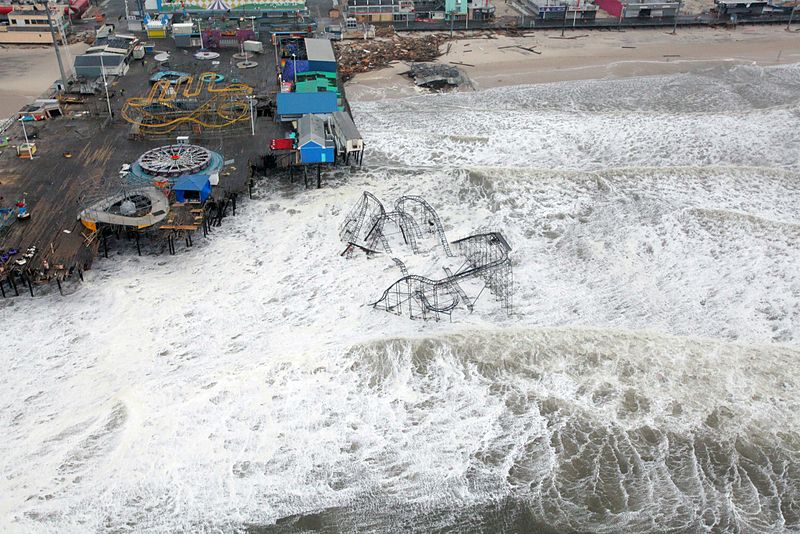 New Jersey Shore Likely Faces Unprecedented Flooding By Mid-Century.
New Jersey Shore Likely Faces Unprecedented Flooding By Mid-Century. Rutgers University has the
press release and links to new research; here's an excerpt: "
Geoscientists at Rutgers and Tufts
universities estimate that the New Jersey shore will likely experience a
sea-level rise of about 1.5 feet by 2050 and of about 3.5 feet by 2100 –
11 to 15 inches higher than the average for sea-level rise globally
over the century. That would mean, the scientists say, that by the
middle of the century, the one-in-10 year flood level at Atlantic City
would exceed any flood known there from the observational record,
including Superstorm Sandy..."
Photo credit above: Master Sgt. Mark C. Olsen, New Jersey Air National Guard. "
The amusement pier at Seaside Heights, N.J., under attack by Hurricane Sandy."
Satellites Reveal Browning Mountain Forests. I've noticed this traveling to the Rockies in recent years, and it appears to be a global trend. Here's an excerpt from
mongabay.com: "
In
a dramatic response to global warming, tropical forests in the high
elevation areas of five continents have been "browning" since the 1990s.
They have been steadily losing foliage, and showing less photosynthetic
activity. Scientists analyzed the forest cover by using satellites to
measure sunlight bouncing off the surface of the earth, then determining
the different surface types via reflection patterns..."
Photo credit above: "
Rainforest valley in the upper Amazon, Peru." Photo by Rhett Butler, mongabay.com.
Climate Change Capitalism.
Can the markets "self-correct" in time? We have to rethink growth,
consumption, and figure out ways toward sustainable capitalism. A big
challenge indeed. Here's an excerpt of a story at
U.S. News and World Report: "
Several
leading energy companies and public utilities have quietly accepted the
reality of climate change. They acknowledge that carbon will be taxed
or a price added to it
to discourage fossil fuel use and encourage renewable energy sources.
In their long-term strategies, they now assume that the cost of carbon
will rise significantly. Last week, a non-profit research organization
called CDP, (formerly the Carbon Disclosure Project ), reported
the carbon pricing outlook of 29 major U.S. corporations. These
companies include many leaders in the energy and utility industry. Many
of them have denied the existence of climate change and actively opposed
all efforts to address it..."
An Apparent Hiatus In Global Warming? It turns out the oceans, especially deep oceans, may be absorbing some of the "missing heat". Here's an excerpt of an
abstract of a new paper from climate scientists Kevin Trenberth and John Fasullo: "...
More
than 90% of the heat goes into the oceans and, with melting land ice,
causes sea level to rise. For the past decade, more than 30% of the heat
has apparently penetrated below 700 m depth that is traceable to
changes in surface winds mainly over the Pacific in association with a
switch to a negative phase of the Pacific Decadal Oscillation (PDO) in
1999. Surface warming was much more in evidence during the 1976–1998
positive phase of the PDO, suggesting that natural decadal variability
modulates the rate of change of global surface temperatures while
sea-level rise is more relentless. Global warming has not stopped; it is
merely manifested in different ways."
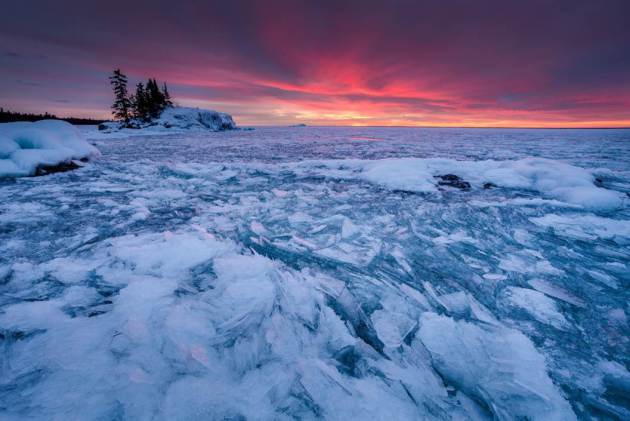
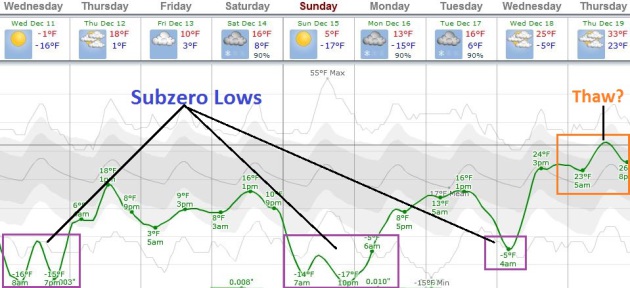
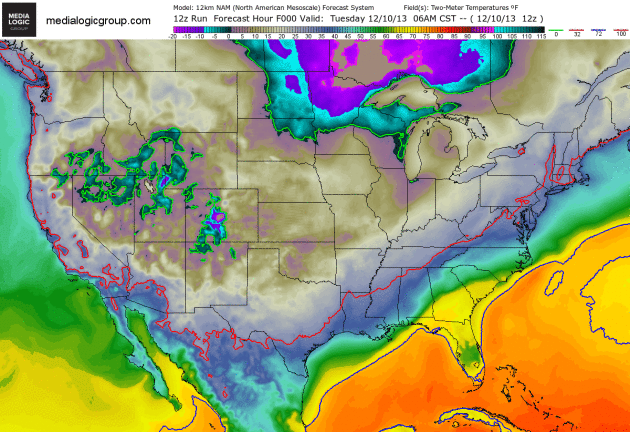
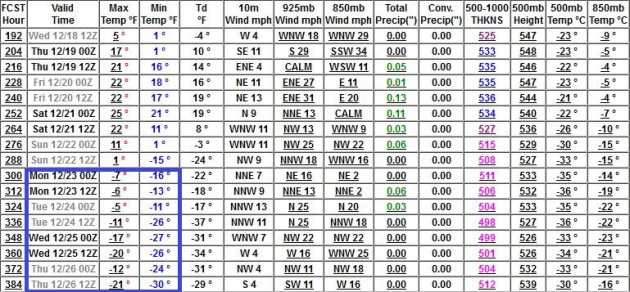
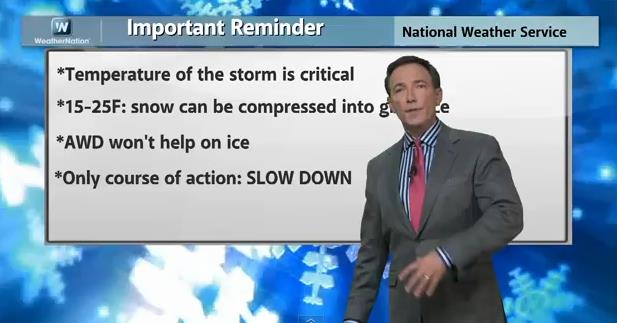
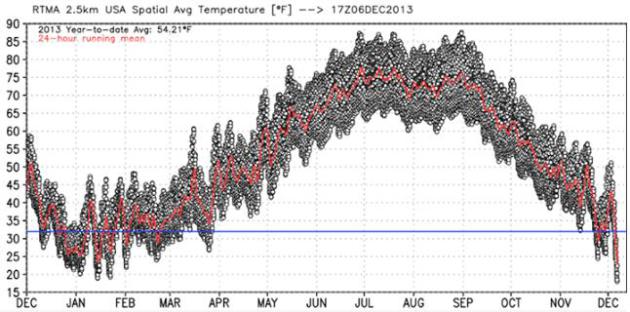
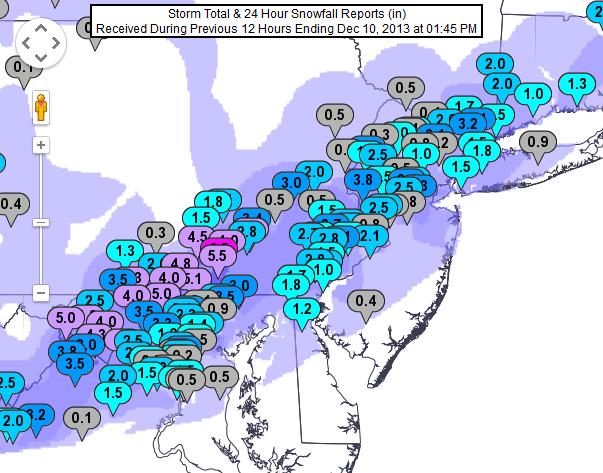
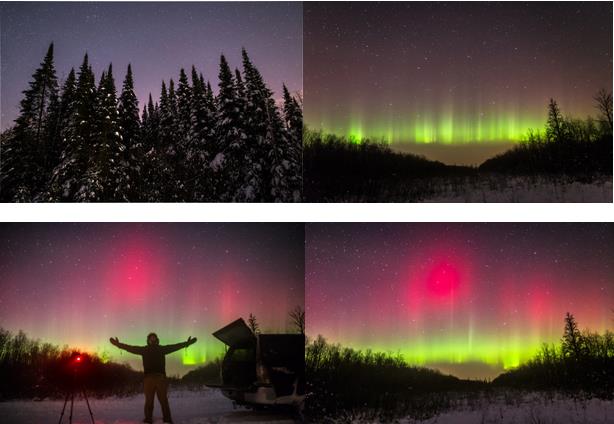
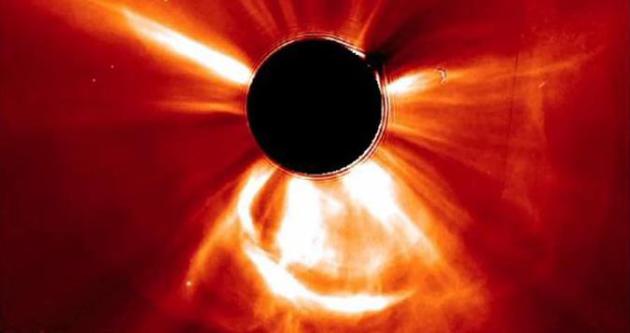


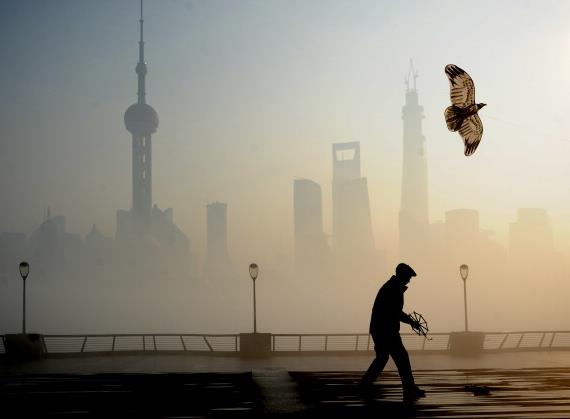
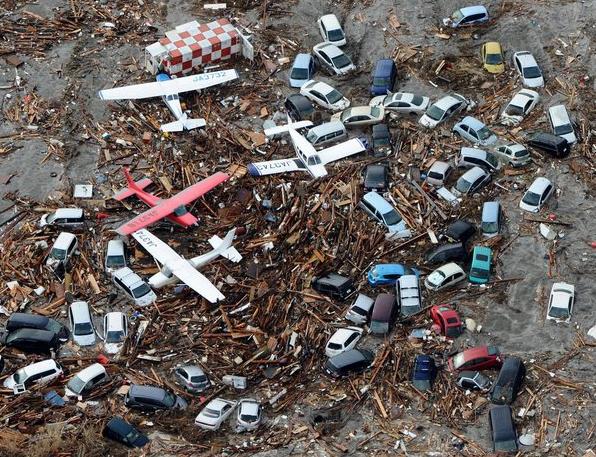
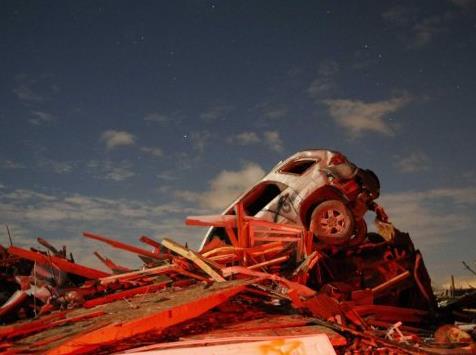
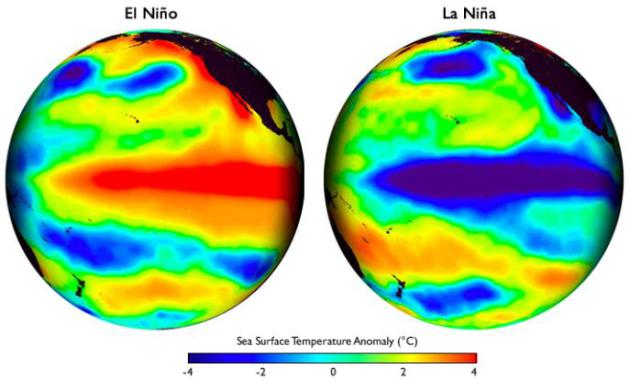





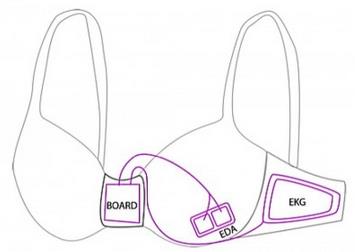
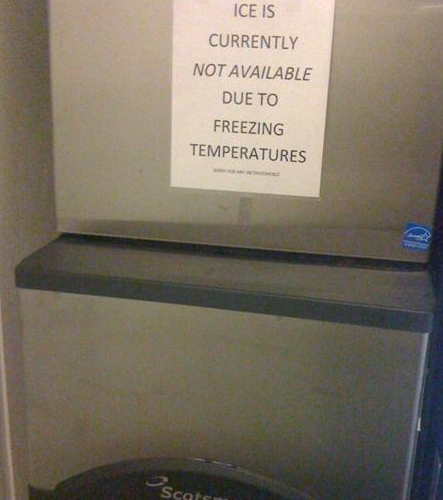
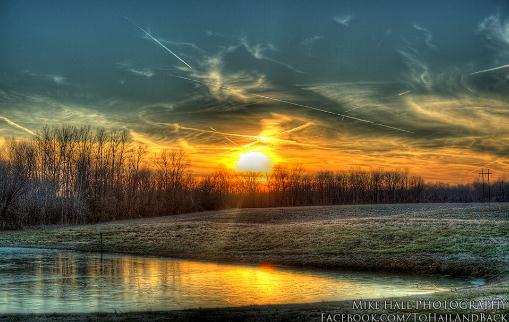
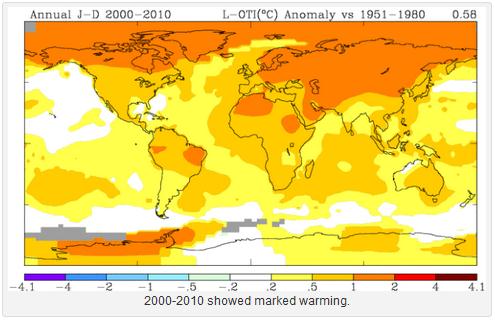

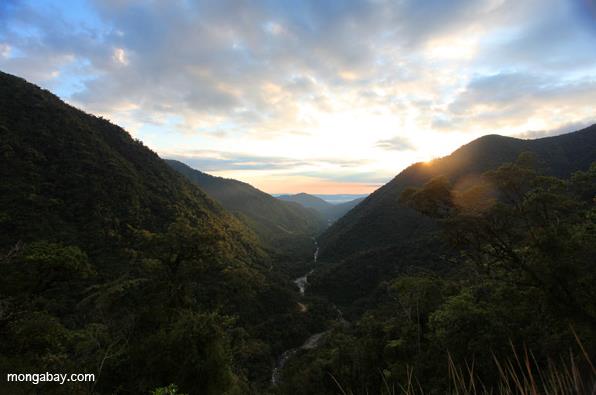
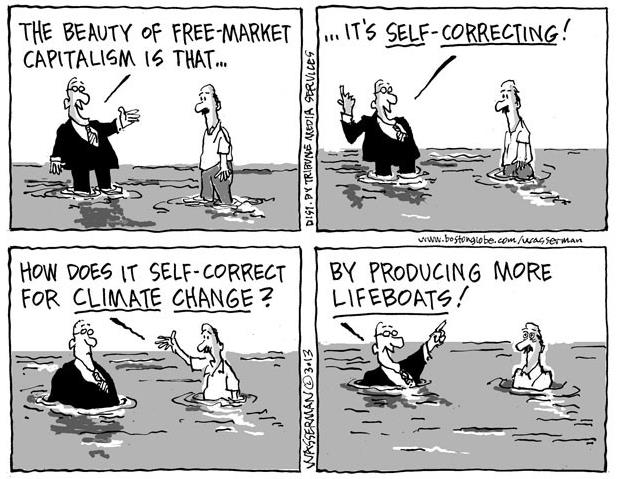
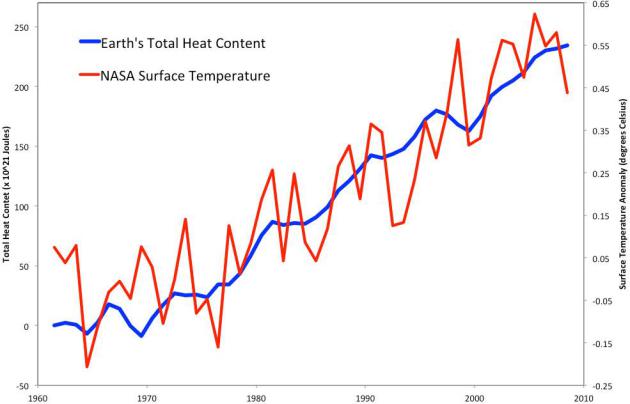
No comments:
Post a Comment